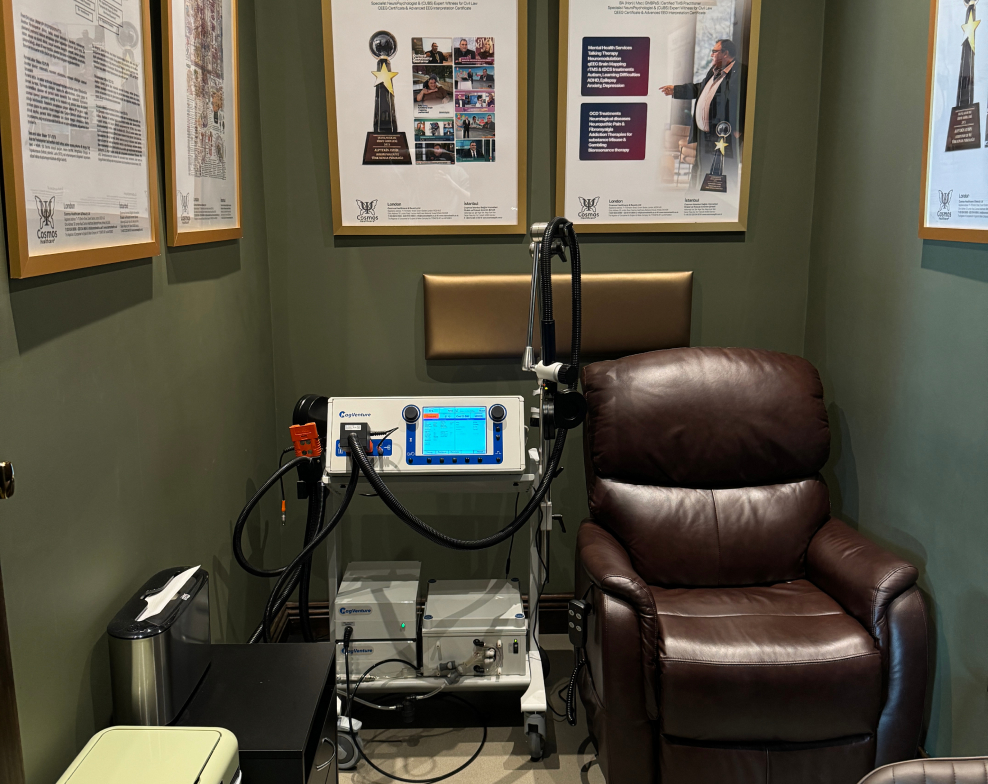
qEEG Guided, Personalized Home-Based tDCS Depression Treatment
Transcranial Direct Current Stimulation (tDCS) stands out as an effective non-invasive neuromodulation approach for depression treatment. The use of quantitative electroencephalography (qEEG) combined with sophisticated algorithms such as Neuromap enables the customization of tDCS treatment according to individual brain patterns which improves treatment outcomes.
Personalized tDCS Treatment with qEEG-Guided Neuromap
Clinicians can create individualized tDCS treatment protocols through the combination of qEEG and the Neuromap algorithm.
– The qEEG method enables real-time brainwave assessment to pinpoint brain regions showing dysfunction related to depression.
– Through qEEG data analysis Neuromap identifies the best tDCS parameters like electrode placement and current intensity to achieve targeted brain region modulation.
Patients with treatment-resistant depression show multiple brainwave patterns including reduced prefrontal alpha activity and elevated right frontal activity.
– Low levels of activity in the prefrontal alpha band show a connection with decreased motivation levels and challenges in maintaining focus.
– Increased activity in the right frontal region of the brain correlates with heightened rumination and negative thought processes.
– Abnormal Delta Wave Synchronization shows a direct relationship with extreme fatigue levels and reduced psychomotor speed.
Neuromap’s mapping process for brain anomalies enables tDCS therapy to precisely target dysfunctional brain regions which may enhance treatment results.
Regulatory Approvals for tDCS in Depression Treatment
The global approval of tDCS as a depression treatment shows significant variation from one region to another.
– The European Union granted CE approval to tDCS for major depressive disorder which permits its clinical application in multiple European countries.
– The National Institute for Health and Care Excellence (NICE) in the United Kingdom has released guidelines about tDCS for depression treatment while recognizing its potential effectiveness.
– Both Australia and Mexico have authorized the use of tDCS to treat depression which shows its expanding global acceptance.
– The U.S. Food and Drug Administration (FDA) had not granted approval for any tDCS applications by the year 2015.
The pairing of qEEG-guided Neuromap analysis with tDCS creates a tailored depression treatment method that matches current worldwide trends in neuromodulation therapy.
Utilizing qEEG-Guided Neuromap Analysis enables personalized Transcranial Direct Current Stimulation (tDCS) treatments specifically for patients with depression.
Neuromodulation therapies evolution changed our understanding and treatment strategies for depression. Traditional medication methods offer benefits to numerous patients but do not address the specific neurophysiological dysfunctions that vary among individuals. An innovative patient-specific treatment approach emerges from combining qEEG-guided Neuromap analysis with Transcranial Direct Current Stimulation (tDCS) which targets precise cortical areas responsible for mood regulation and emotional stability.
Standard antidepressant treatments work systemically through neurotransmitter pathways while qEEG-driven tDCS therapy customizes treatment to match each patient’s unique neural pattern to deliver more precise therapeutic results. Personalized psychiatry becomes more prevalent as treatments shift to individual biomarker-based solutions instead of general therapeutic approaches.
Using qEEG-based tDCS improves neural regulation specifically for depression treatment.
The human brain functions as an elaborate network of interconnected regions which collectively support emotional resilience and cognitive flexibility while maintaining mood stability. Depression affects brain networks uniquely in each person so successful treatments need to consider these individual differences.
The Neuromap algorithm processes quantitative electroencephalography (qEEG) data to identify dysregulation patterns with superior precision compared to typical diagnostic methods. The tDCS system provides tailored neuromodulation to rectify neural dysfunctions while fostering adaptive neural plasticity that matches each patient’s specific condition.

The treatment regulates either inactive or excessively active brain circuits to maximize the brain’s self-healing abilities and produce.
– More sustainable improvements in mood regulation
– The technique improves how emotions are processed while breaking down cycles of negative thinking.
– Enhanced activation of the prefrontal cortex leads to improved executive functions and concentration capabilities.
– Chronic depression leads to decreased physiological stress responses through targeted brain stimulation.
Scientific studies demonstrate that qEEG-guided tDCS leads to enhanced symptom relief with quicker recovery and more enduring results than standard tDCS treatments.
The field of psychiatry has evolved through data-driven methods as personalized brain stimulation becomes more prevalent.
Clinical depression management now follows a new approach due to the incorporation of artificial intelligence (AI) into qEEG analysis. The Neuromap AI tool updates its therapeutic recommendations as it receives live neurophysiological data.
– The treatment’s intensity and period must change according to how well the patient responds.
– The therapy delivers optimal benefits through real-time updates of tDCS parameters.
– This technology enables clinicians to observe brain activity patterns that signal potential treatment resistance or elevated chances of relapse before they occur.
The approach represents a core change toward adaptive neurotherapy which enables treatment adaptation based on the brain’s real-time functional state instead of following fixed protocols.
Neuromodulation methods are becoming widely accepted across the globe as essential tools for depression therapy.
The development of mental health care includes neuromodulation as an essential element of depression treatment according to global regulatory bodies and clinical researchers. The regionally varying acceptance of tDCS is leading psychiatric practices toward a future where precision neuromodulation establishes itself as the standard treatment for mood disorders.
The broad implementation of qEEG-directed and AI-enhanced tDCS protocols will speed up global adoption that permits patients around the world to receive personalized and non-invasive depression treatment options. The current change in mental health practices signals the beginning of neuroscience-guided mental health care that delivers proactive, data-dependent personalization in depression treatment .